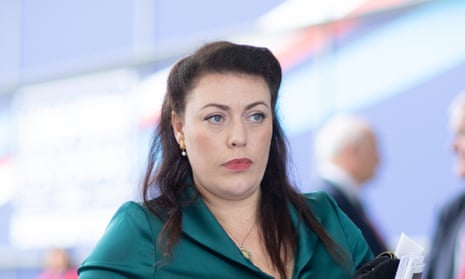A senior Conservative MP launched a scathing attack on a controversial bill banning local councils from boycotting Israel, as eight Tories voted against the proposed legislation.
Alicia Kearns, the Conservative chair of the foreign affairs select committee, told the Guardian that the bill undermined free speech, went against international law and risked leaving the UK isolated on the global stage.
While the bill passed by 282 votes to 235, eight Conservative MPs voted against the legislation, which will cause some embarrassment to its chief supporter, Michael Gove.
Kearns said: “This bill is flawed in four key areas: it breaks with our foreign policy; undermines freedom of speech; goes against international law; and promotes an odd exceptionalism in UK primary legislation.
“We rely on the rules-based system to protect ourselves and to protect our allies and yet we are at risk of breaching UN security council resolution 2334, a resolution the UK was instrumental in drafting.
“Legislation created by the Department for Levelling Up, Housing and Communities must not depart from our foreign policy, let alone undermine it or leave us ostracised internationally.”
A spokesperson for Gove’s department said: “Public bodies imposing boycotts on foreign countries not only undermine the UK’s foreign policy but can also fuel division across our communities. This change delivers on the government’s manifesto, stopping public bodies from wasting taxpayers’ money pursuing their own foreign policy agendas and ensuring that the UK speaks with one voice internationally.”
Kearns is one of the most prominent centrists within the Tory party. Kit Malthouse, a long-time ally of Boris Johnson, is also planning to rebel.
But concern about ithe proposed legislation’s contents is also present on the right of the party. David Jones, the deputy chair of the European Research Group, is also planning to vote against the bill because of the status it grants to Israel.
The bill is aimed at stopping public bodies across the UK from levying any kind of sanction regime against a government that is not also being placed under sanctions by the UK government. Two Labour-led councils said they would boycott goods from Israel in protest at the country’s policies towards the occupied Palestinian territories.
However, several Conservative MPs have said they are opposed to the bill because of the way it explicitly names Israel as worthy of special protection, and appears to include the occupied territories as part of its definition of Israel.
Crispin Blunt and William Wragg voted against the bill at second reading. A much bigger rebellion at the third reading would indicate that Tory whips have lost influence since then.
Senior Conservatives had hoped the bill would help divide Labour over the sensitive issue of Israel and Palestine, torn between the natural support of many Labour MPs for the Palestinian cause and the party leader Keir Starmer’s desire not to allow any appearance of antisemitism.
The bill’s report stage was held last October, just weeks after the Hamas attack on southern Israel, in what critics of the proposed legislation said was a political move designed to capitalise on the attack.
Labour, however, confirmed on Wednesday morning it would whip MPs to vote against the bill. Wayne David, a shadow foreign office minister, wrote on the Labour List website: “The most damaging part of the bill is that it treats the occupied Palestinian territories as though they were in effect the same as the State of Israel.
“This runs directly counter to decades of British diplomacy by Conservative and Labour governments alike, and it could not come at a worse time.”









